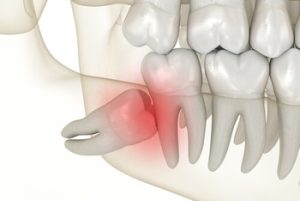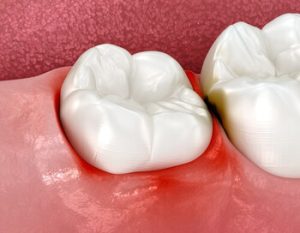Wisdom teeth. Those elusive third molars seem to show up when you think you’re done with dental growing pains. While some people never have issues, others find themselves dealing with inflamed gums, wisdom teeth pain, or even needing all four wisdom teeth removed. If you’re in the latter group, you’re probably asking: how much does wisdom teeth removal cost in Australia?
This blog will help you understand the costs, what’s involved in the procedure, why removal is sometimes necessary, and how to prepare financially and physically.
First Things First: Why Do Wisdom Teeth Cause Problems?
Third molars, more commonly called wisdom teeth, typically erupt sometime between the ages of 17 and 25. For some lucky individuals, these teeth grow in without causing any trouble. However, for many others, wisdom teeth can lead to multiple oral health issues that require professional attention.
 They Often Don’t Have Enough Room to Grow
They Often Don’t Have Enough Room to Grow
Most people simply don’t have enough space in their jaws to accommodate four extra molars. When wisdom teeth grow in a cramped space, they can push against nearby teeth, leading to overcrowding, misalignment, and discomfort.
They Can Become Impacted
An impacted wisdom tooth is one that doesn’t fully erupt through the gum. It might grow at an angle, sideways, or only partially break through the gum tissue. Impacted teeth are painful and difficult to clean, increasing the risk of gum disease, cavities, or infection.
They May Cause Damage to Other Teeth
When wisdom teeth press against neighbouring teeth, they can damage the roots or wear away enamel. This may require additional dental treatments beyond wisdom tooth extraction, like fillings or even root canals.
They Increase the Risk of Infection
Partially erupted wisdom teeth create pockets where bacteria can get trapped. This can lead to inflamed gums, bleeding gums, or painful infections. Cysts may sometimes develop, potentially damaging bone and surrounding structures.
They Can Compromise Overall Oral Health
Even if you’re not feeling pain right away, wisdom teeth can silently impact your oral health. Dentists often recommend proactive teeth removal to prevent problems before they start, especially if X-rays show your third molars are misaligned or crowding your smile.
What Happens During Wisdom Tooth Removal?
So, your dentist has recommended wisdom tooth extraction; now what? Being informed about the procedure can make you feel more at ease and better prepared, whether you’re removing a single tooth or all four.
The process varies depending on whether it’s a simple extraction or a more complex surgical wisdom tooth removal. Let’s walk through both types.
Simple Extraction: When the Tooth Has Fully Erupted
If your wisdom tooth has come through the gum completely and is in a good position, you may only need a simple tooth extraction. Here’s what typically happens:
- Initial consultation: Your dentist will examine your mouth, take X-rays, and assess how your wisdom teeth are growing. This helps determine whether a simple or surgical removal is needed.
- Local anaesthesia: A local anaesthetic numbs the area around the tooth so you feel some pressure but remain comfortable.
- Tooth removal: The dentist gently loosens the tooth using a dental tool and lifts it out. The procedure is usually quick and straightforward.
- Aftercare: A piece of gauze is placed over the extraction site to help control bleeding and support blood clot formation. You’ll be given post-op care instructions and possibly some pain medication.
Surgical Extraction: When Things Get a Bit More Complex
If your wisdom tooth is impacted, sitting below the gum line, or growing at an awkward angle, you’ll likely need a surgical extraction. This is usually performed by an expert dentist with experience in advanced surgical techniques.
Here’s what that might look like:
- Consultation and imaging: The dentist will assess the position of your impacted wisdom teeth using panoramic X-rays or 3D scans.
- Anaesthesia options:
- Local anaesthetic for numbing the area.
- Sedation for relaxation (common for nervous patients).
- General anaesthesia if you’re having multiple teeth removed in a hospital setting.
- The procedure:
- A small incision is made in the gum to reach the tooth.
- In some cases, the surrounding bone may be carefully removed to allow better access.
- The tooth may be sectioned into smaller pieces to make removal easier and safer.
- After the tooth is taken out, the site is cleaned thoroughly and stitched if necessary to aid healing.
- Post-op care: After the procedure, you’ll rest in the clinic or recovery room until you’re cleared to go home. You’ll get detailed instructions for managing swelling, bleeding, and pain.
How Long Does Wisdom Tooth Removal Take?
- Simple extraction: About 20 to 30 minutes per tooth.
- Surgical wisdom tooth removal may take 45 minutes to over an hour, especially if multiple teeth are involved or general anaesthesia is used.
How to Know if You Need Surgical Removal
Not all wisdom teeth need to be removed surgically. During your initial consultation, your dentist will take X-rays to check how your third molars are growing.
You may require surgical procedures if:
- The tooth is below the gum line or partially erupted
- It’s growing sideways or pushing against other teeth
- It’s impacted by bone or close to nerves
What to Expect After Wisdom Teeth Surgery
Post-surgery recovery varies depending on the complexity of the procedure and your own health. Here’s what’s typical:
- Swelling and bleeding gums for 24 to 48 hours
- Bruising or tenderness near the tooth extraction site
- Eating only soft foods for a few days
- A healing period of about a week
You’ll also be given pain medication, and your dentist will likely recommend avoiding strenuous activity, alcohol, and smoking while you heal.
Aftercare Tips: Healing Like a Pro
Here’s how to care for yourself after wisdom tooth extraction to support a smooth recovery:
- Control bleeding: Bite down gently on gauze for 30–60 minutes to form a proper blood clot.
- Reduce swelling: Place an ice pack on the cheek (15 minutes on, 15 minutes off) for the first 24 hours.
- Eat soft foods: Stick to soups, mashed potatoes, yoghurt, and scrambled eggs for a few days.
- Take pain medication: Follow your dentist’s instructions for over-the-counter or prescribed relief.
- Keep it clean: Gently rinse with warm salt water after 24 hours; avoid brushing directly over the tooth extraction site.
- Get plenty of rest: Limit physical activity for at least 48 hours after surgery.
- Avoid smoking and alcohol: Both can delay healing and increase infection risk.
- Watch for warning signs: Contact your dental clinic if you notice severe pain, swelling, fever, or unusual discharge.
Tips for Sleeping After Wisdom Teeth Removal
Getting good rest after wisdom teeth surgery is essential for healing, but it can be tricky when your mouth is sore. Here are a few helpful tips for a more comfortable recovery:
- Elevate your head: Use two pillows or a wedge to prop your head up slightly while sleeping. This helps minimise swelling and prevents pressure on the tooth extraction site.
- Sleep on your back: To prevent putting pressure on the extraction site, as lying on your side may worsen soreness and swelling.
- Avoid sleeping flat: Lying flat may increase blood flow to the head, which can worsen bleeding gums and throbbing.
- Follow your pain relief plan: Take your pain medication as prescribed before bed to help you stay comfortable throughout the night.
- Keep gauze out: Remove gauze before sleeping to prevent choking risks unless your dentist specifically advises otherwise.
Following these tips can make a big difference in the first few nights after oral surgery.
When Can You Go Back to Work, School, or Exercise?
Knowing when it’s safe to resume your normal routine is a common concern after wisdom teeth removal. Here’s a general guide, depending on the type of procedure and your recovery:
- Desk work or study: You can usually return within 1–2 days, especially after a simple tooth extraction. Just be sure to rest and stay hydrated.
- Light exercise: Walking or light movement may be resumed after 3–5 days, provided you’re not experiencing swelling or discomfort.
- Heavy lifting or intense workouts: Wait at least 7 days. Strenuous activity too soon can disrupt healing and increase the risk of bleeding or dry socket.
Your dentist will give personalised guidance based on how your wisdom tooth removal procedure went. When in doubt, it’s best to err on the side of caution; a few days of rest can make a big difference in your healing.
Are There Risks Involved?
Like any common dental procedure, wisdom teeth removal carries some risks, although complications are rare when performed by an experienced dental professional. These may include:
- Infection
- Dry socket (loss of blood clot)
- Nerve damage
- Damage to nearby teeth
- Prolonged bleeding
Contact your dentist immediately if you experience severe pain, inflamed gums, or fever after the procedure.
The Cost of Wisdom Teeth Removal: A Closer Look
Here’s where things get real. The cost of wisdom teeth removal varies significantly depending on several factors:
1. How Many Teeth Need to Be Removed
Removing one tooth is naturally cheaper than removing four wisdom teeth at once. However, some clinics offer a bundle price for multiple dental extractions in a single appointment.
2. Simple vs Surgical: What Does It Cost to Remove Wisdom Teeth?
The cost of wisdom teeth removal in Australia depends heavily on whether the procedure is straightforward or requires surgery. Here’s a quick look at the starting prices:
- Simple tooth extraction starts from $200 per tooth. This applies when the wisdom tooth has fully erupted and can be removed easily without cutting into the gum.
- Surgical extraction starts from $350 per tooth. This is needed when the tooth is partially erupted, impacted, or requires sectioning and removal of surrounding bone.
- If you’re having wisdom teeth removal surgery under general anaesthesia in a hospital setting, prices typically start from $1,500, especially when multiple teeth need to be removed in one visit.
These are base estimates and can vary depending on the dental clinic, your location, and whether you’re covered by private health insurance. Always confirm what’s included in your quote during the initial consultation.
Worried About the Cost? Let’s Talk Financing Options
We understand that the cost of wisdom teeth removal can feel overwhelming, especially if you need all four wisdom teeth removed or require surgical procedures. The good news? There are several ways to make treatment more affordable without compromising on quality dental care.
Private Health Insurance Coverage
Many Australians use private health insurance with extra coverage to help offset the wisdom tooth removal cost. If your policy includes dental, you may be eligible for rebates on consultations, X-rays, extractions, anaesthesia, and follow-up visits. Some dental clinics are preferred providers by BUPA or NIB, which may result in higher rebates and lower out-of-pocket expenses for eligible patients.
Acceptance of All Major Health Funds
Most dental clinics across Australia accept claims from all major private health insurers. Claims can typically be processed on the spot, so patients only need to pay the gap amount not covered by their fund.
Flexible Payment Plans
In cases where insurance does not cover the full removal cost, some dental clinics offer flexible, interest-free payment plans. These options allow patients to pay for their wisdom tooth removal procedure over time, making it more manageable without delaying treatment.
What’s Typically Included in the Removal Cost?
When you ask for a quote from your dental office, it’s important to check what’s included:
- Initial consultation and X-rays
- Anaesthesia or sedation
- The procedure itself (whether simple or surgical)
- Post-op care and reviews
Wisdom Tooth Extraction Costs in Australia – City vs Regional
Location plays a role in the removal cost as well. In major cities like Sydney or Melbourne, prices may be on the higher end due to higher clinic operating costs. Rural and regional areas often offer more affordable options, though access to advanced facilities or oral surgery teams may be limited.
Why Getting Wisdom Teeth Removed Early Can Save You Money
It might sound counterintuitive, but removing your wisdom teeth early before they cause trouble can be cheaper and easier in the long run. When teeth are removed before they become impacted, surgical procedures may not be necessary. Plus, you reduce the risk of damage to neighbouring teeth, infections, or emergency teeth surgery later on.
When Should You See a Dentist About Wisdom Teeth?
If you’re experiencing any of the following, it’s time to book that initial consultation:
- Wisdom teeth pain or swelling
- Trouble opening your mouth
- Persistent bleeding gums
- Nearby teeth feel crowded or pressured
- Signs of gum disease
Even if your wisdom teeth haven’t erupted, it’s a good idea to have them checked by a professional to assess whether preventative tooth extraction is recommended.
The Role of X-rays and 3D Imaging in Wisdom Tooth Diagnosis
Modern dental imaging plays a crucial role in accurately diagnosing issues with wisdom teeth, particularly when they are impacted or positioned close to sensitive structures. During your initial consultation, your dentist may take panoramic X-rays or use 3D imaging to assess your third molars in greater detail.
These scans help identify:
- The exact angle and depth of the impacted wisdom teeth
- How close the roots are to nerves or sinuses
- Whether any neighbouring teeth are at risk of damage
- Signs of infection, cysts, or bone loss
With this detailed view, your dental professional can determine whether a simple extraction will suffice or if surgical wisdom tooth removal is required. This technology reduces guesswork, improves outcomes, and helps your dentist plan a safe and efficient wisdom tooth removal procedure.
Wisdom Teeth and Age: Is There a Right Time to Remove Them?
Timing matters when it comes to wisdom teeth removal. While not everyone needs their third molars extracted, dentists often recommend removal during the late teens or early twenties, and for good reason.
Younger patients tend to have:
- Softer bone tissue, making tooth extraction easier
- Less complex root development
- Faster healing and fewer complications after oral surgery
Leaving wisdom teeth too long can increase the risk of impaction, infections, and even damage to other teeth. The bone is denser in older adults, and recovery may take longer. Early intervention is often a proactive step to maintain long-term oral health and avoid more involved surgical procedures later.
Wisdom Teeth Removal and Orthodontic Treatment

In some cases, impacted teeth remain hidden under the gums but still exert pressure on the dental arch. This can cause teeth to shift, become crowded, or misaligned. Even after orthodontic treatment is complete, erupting third molars can contribute to orthodontic relapse if they’re not monitored or removed.
For this reason, many orthodontic treatment plans include a wisdom tooth extraction evaluation, especially if the four wisdom teeth haven’t erupted yet or appear to be coming in at awkward angles.
Final Thoughts: Don’t Let Wisdom Teeth Catch You Off Guard
Getting your wisdom teeth removed can feel daunting, especially when you’re unsure about the cost. But with the right information, a trusted dental team, and proper aftercare, the process can be smooth and comfortable.
Whether you need one tooth out or all four wisdom teeth extracted, knowing what to expect and how to budget for it makes all the difference. Speak to your local dental office, ask about out of pocket expenses, and get clarity on the full wisdom tooth removal procedure before you proceed.
Your Oral Health is Worth It
Taking care of your oral health means more than just brushing and flossing. Sometimes, it means tackling those third molars head-on and making sure they don’t disrupt your smile or your well-being. If you’re ready to remove wisdom teeth and take the next step toward a healthier mouth, don’t wait. Get in touch with Pearl Dental Care at 02 9158 6312 and explore your options today.
Note: Any surgical or invasive procedure carries risks. Before proceeding, you should seek a second opinion from an appropriately qualified health practitioner.
References
Mayo Clinic. (n.d.). Wisdom teeth: Symptoms and causes. Mayo Clinic. https://www.mayoclinic.org/diseases-conditions/wisdom-teeth/symptoms-causes/syc-20373808
Healthline. (n.d.). Dental anesthesia: Types, side effects, and more. https://www.healthline.com/health/dental-and-oral-health/dental-anesthesia
NHS. (n.d.). Orthodontics. https://www.nhs.uk/conditions/orthodontics/#:~:text=Orthodontics%20involves%20the%20use%20of,well%20as%20wearing%20a%20brace.
Cleveland Clinic. (n.d.). Dental X-rays. https://my.clevelandclinic.org/health/diagnostics/11199-dental-x-rays
Medical News Today. (n.d.). Eight effective home remedies for stopping bleeding. https://www.medicalnewstoday.com/articles/319433#raise-the-affected-area
MedlinePlus. (n.d.). Over-the-counter pain relievers. U.S. National Library of Medicine. https://medlineplus.gov/ency/article/002123.htm


 They Often Don’t Have Enough Room to Grow
They Often Don’t Have Enough Room to Grow